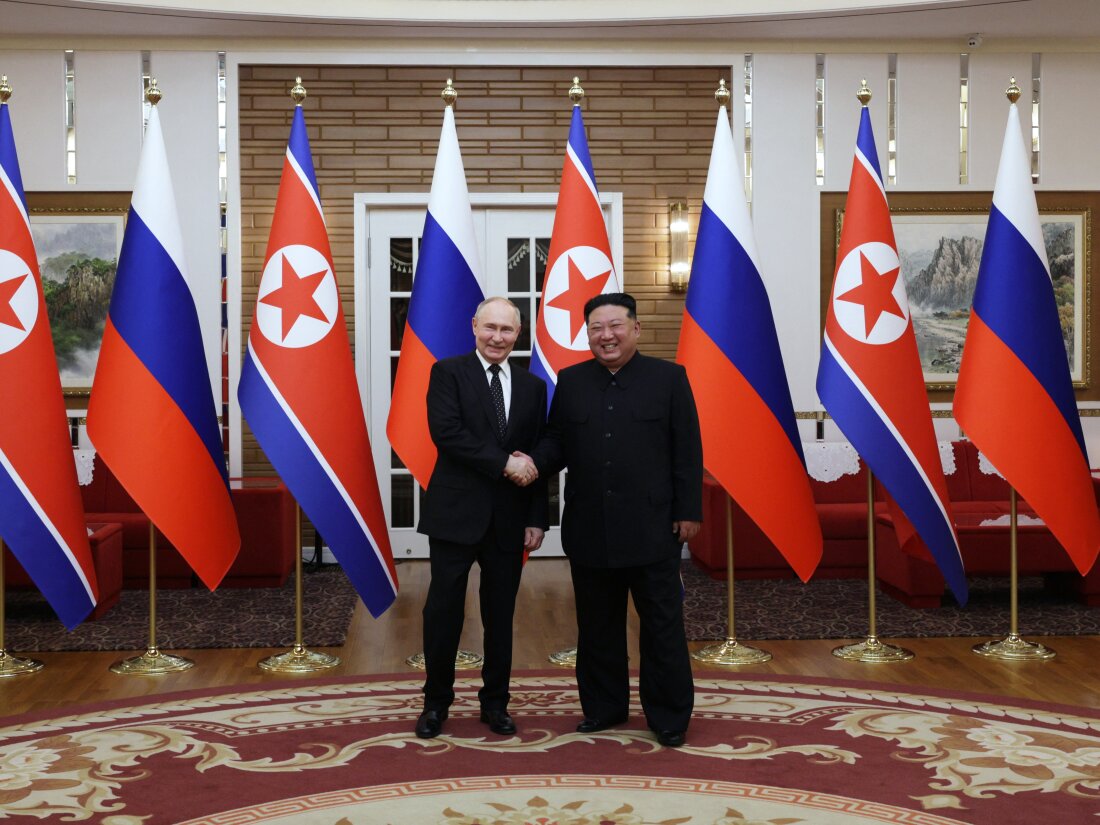On December 4, 2024, a pivotal defense treaty between the DPRK and Russia officially took effect, solidifying a long-standing alliance. This treaty, signed in June between Kim Jong-un and Vladimir Putin, lays the groundwork for comprehensive military cooperation, particularly mutual support in the event of an attack on either nation.
The treaty reflects growing ties between the two countries, especially following North Korea’s involvement in supporting Russia during the ongoing Ukraine conflict.
Background and Context
The defense agreement comes at a time when global geopolitics are shifting, with the DPRK and Russia increasingly aligning their positions. The treaty is not just about military cooperation but also signifies a deeper, strategic partnership that encompasses regional and global security dynamics.
Both countries have faced international sanctions and diplomatic isolation, which have pushed them into closer alignment. While the world remains focused on Russia’s war in Ukraine, North Korea has strengthened its military ties with Moscow, and this treaty is a testament to that evolving relationship.
Key Provisions of the Treaty
Under the new agreement, both the DPRK and Russia have pledged to come to each other’s aid “without delay” in the event of an armed attack. This could see mutual military intervention in times of crisis, marking a clear break from the past, as it effectively revives a Cold War-era defense alliance. The pact is viewed by many as a mechanism for both countries to secure their interests in the face of mounting global pressure.
In addition to military cooperation, the treaty also includes provisions aimed at strengthening economic ties and bolstering their broader strategic alignment. This comes at a time when Russia, facing significant Western sanctions, seeks alternative alliances, while North Korea, which has long struggled under its own set of sanctions, aims to leverage partnerships with global powers like Russia to circumvent economic isolation.
DPRK-Russia Military Cooperation: A Growing Partnership
While the two countries have long maintained a certain level of cooperation, this new defense pact formalizes a relationship that has been evolving over recent years. North Korea has already sent military personnel to support Russia’s war effort in Ukraine, further cementing the military ties between the two nations. The treaty promises to institutionalize this cooperation, providing both nations with a strategic buffer against external threats and enhancing their military capabilities.
For the DPRK, the treaty also represents an opportunity to modernize its military and gain access to advanced Russian technology. Meanwhile, Russia stands to gain access to North Korea’s resources, including its strategic positioning in East Asia. This alliance signals a shift away from Western-backed diplomatic efforts in favor of deeper ties with nations that are similarly opposed to Western hegemony.
Implications for Global Security
The DPRK-Russia defense treaty is significant not only for the two nations but also for the broader geopolitical landscape. With the rise of a multipolar world order, where power is more diffused and alliances are constantly shifting, this treaty adds another layer to the complex web of international relations. As both North Korea and Russia face increasing isolation from the West, this partnership offers them an opportunity to counterbalance the influence of NATO and its allies.
One of the most important aspects of the treaty is the potential for mutual military intervention. Should either nation be attacked, the other is now bound to respond. While this could stabilize the internal security of the two nations, it also has the potential to escalate tensions in the region, especially in the context of the ongoing conflict in Ukraine.
The Future of DPRK-Russia Relations
With the treaty now in effect, North Korea and Russia are poised to deepen their military and strategic cooperation. Experts believe that this could lead to further economic and military agreements, potentially providing both nations with the leverage they need to challenge Western influence. However, the treaty also poses risks, particularly for global stability. As the DPRK and Russia continue to strengthen their partnership, the international community will be closely watching how their cooperation develops, especially given the shifting alliances and power dynamics at play.
In conclusion, the DPRK-Russia defense treaty represents a significant turning point in the relationship between the two nations. By formalizing military support and expanding their strategic partnership, both countries are setting the stage for a new era of cooperation that will have lasting implications for global security.

